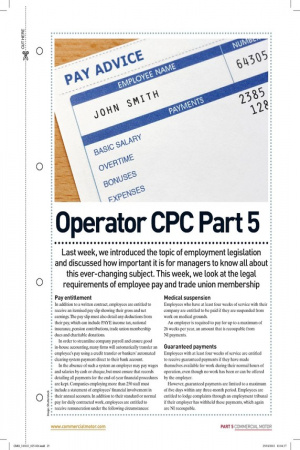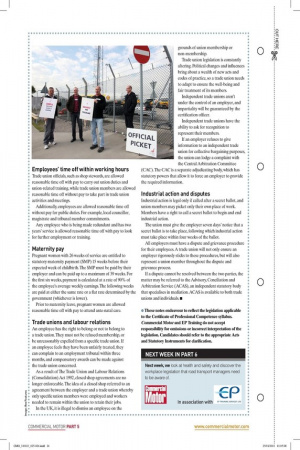erator CPC Part 5
Page 17

Page 18

If you've noticed an error in this article please click here to report it so we can fix it.
Last week, we introduced the topic of employment legislation and discussed how important it is for managers to know all about this ever-changing subject. This week, we look at the legal requirements of employee pay and trade union membership Pay entitlement In addition to a written contract, employees are entitled to receive an itemised pay slip showing their gross and net earnings. The pay slip must also detail any deductions from their pay, which can include PAYE income tax, national insurance, pension contributions, trade union membership dues and charitable donations.
In order to streamline company payroll and ensure good in-house accounting, many firms will automatically transfer an employee's pay using a credit transfer or bankers' automated clearing system payment direct to their bank account.
In the absence of such a system an employer may pay wages and salaries by cash or cheque, but must ensure that records detailing all payments for the end-of-year financial procedures are kept. Companies employing more than 250 staff must include a statement of employees' financial involvement in their annual accounts. In addition to their standard or normal pay for daily contracted work, employees are entitled to receive remuneration under the following circumstances: Medical suspension Employees who have at least four weeks of service with their company are entitled to be paid if they are suspended from work on medical grounds.
An employer is required to pay for up to a maximum of 26 weeks per year, an amount that is recoupable from NI payments.
Guaranteed payments Employees with at least four weeks of service are entitled to receive guaranteed payments if they have made themselves available for work during their normal hours of operation, even though no work has been or can be offered by the employer.
However, guaranteed payments are limited to a maximum of five days within any three-month period. Employees are entitled to lodge complaints through an employment tribunal if their employer has withheld these payments, which again are NI recoupable.
Employees' time off within working hours Trade union officials, such as shop stewards, are allowed reasonable time off with pay to carry out union duties and union-related training, while trade union members are allowed reasonable time off without pay to take part in trade union activities and meetings.
Additionally, employees are allowed reasonable time off without pay for public duties. For example, local councillor, magistrate and tribunal member commitments.
Any employee who is being made redundant and has two years' service is allowed reasonable time off with pay to look for further employment or training.
Maternity pay Pregnant women with 26 weeks of service are entitled to statutory maternity payment (SMP) 15 weeks before their expected week of childbirth. The SMP must be paid by their employer and can be paid up to a maximum of 39 weeks. For the first six weeks, payment is calculated at a rate of 90% of the employee's average weekly earnings. The following weeks are paid at either the same rate or a flat rate determined by the government (whichever is lower).
Prior to maternity leave, pregnant women are allowed reasonable time off with pay to attend ante-natal care.
Trade unions and labour relations An employee has the right to belong or not to belong to a trade union. They must not be refused membership, or be unreasonably expelled from a specific trade union. If an employee feels they have been unfairly treated, they can complain to an employment tribunal within three months, and compensatory awards can be made against the trade union concerned.
As a result of The Trade Union and Labour Relations (Consolidation) Act 1992, closed shop agreements are no longer enforceable. The idea of a closed shop referred to an agreement between the employer and a trade union whereby only specific union members were employed and workers needed to remain within the union to retain their jobs.
In the UK, it is illegal to dismiss an employee on the grounds of union membership or non-membership.
Trade union legislation is constantly altering. Political changes and influences bring about a wealth of new acts and codes of practice, so a trade union needs to adapt to ensure the well-being and fair treatment of its members.
Independent trade unions aren't under the control of an employer, and impartiality will be guaranteed by the certification officer.
Independent trade unions have the ability to ask for recognition to represent their members.
If an employer refuses to give information to an independent trade union for collective bargaining purposes, the union can lodge a complaint with the Central Arbitration Committee (CAC). The CAC is a separate adjudicating body, which has statutory powers that allow it to force an employer to provide the required information.
Industrial action and disputes Industrial action is legal only if called after a secret ballot, and union members may picket only their own place of work. Members have a right to call a secret ballot to begin and end industrial action.
The union must give the employer seven days' notice that a secret ballot is to take place, following which industrial action must take place within four weeks of the ballot.
All employers must have a dispute and grievance procedure for their employees. A trade union will not only ensure an employer rigorously sticks to these procedures, but will also represent a union member throughout the dispute and grievance process.
If a dispute cannot be resolved between the two parties, the matter may be referred to the Advisory, Conciliation and Arbitration Service (ACAS), an independent statutory body that specialises in mediation. ACAS is available to both trade unions and individuals. • • These notes endeavour to reflect the legislation applicable to the Certificate of Professional Competence syllabus. Commercial Motor and EP Training do not accept responsibility for omissions or incorrect interpretation of the legislation. Candidates should refer to the appropriate Acts and Statutory Instruments for clarification.







































